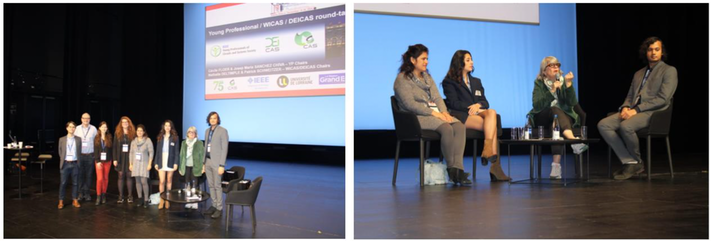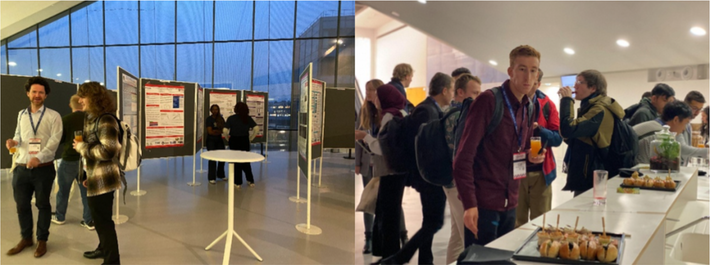Empowering Connections: Joint DEICAS–WiCAS–YPCAS at ICECS 2024
Women in Circuits and Systems (WiCAS), Young Professionals in Circuits and System (YPCAS), and Diversity, Equity and Inclusion Circuits and System (DEICAS) at ICECS 2024
The 31st IEEE International Conference on Electronics, Circuits and Systems (ICECS 2024), held on November 19th in Nancy, France, hosted a vibrant and inspiring joint event organized by the WiCAS (Women in Circuits and Systems), YPCAS (Young Professionals in CAS), and DEICAS (Diversity, Equity, and Inclusion in CAS) initiatives. The event was coordinated by Cécile Floer, Nathalie Deltimple, Patrick Schweitzer, and Josep Maria Sánchez-Chiva, and brought together more than 80 participants—including students, early-career professionals, and senior researchers—to promote inclusivity, professional growth, and community engagement within the IEEE CASS network.
The program opened with a technical session featuring four top-reviewed papers presented by emerging researchers: Mathieu Coustans, Kiichi Niitsu, Ajay Shroti, and Sani Mohammed Lawal. The session, chaired by Cécile Floer and Josep Maria Sánchez-Chiva, covered a range of innovative topics in power management, circuit integration, memory design, and solar technologies.

Figure 1 (left): DEICAS–WiCAS–YPCAS event: panelists and chairs. Figure 2 (right): DEICAS–WiCAS–YPCAS event: round table discussion.
The afternoon continued with a round table discussion titled “How important is communication in a team? Differences between industry and academia. Differences and challenges when you are a woman,” moderated by Nathalie Deltimple, Cécile Floer, Patrick Schweitzer, and Josep Maria Sánchez-Chiva. Panelists Sandrine Bernardini, Sevra Çiçekli, Mashiul Huq, and Florence Sedes contributed personal experiences and professional insights, which sparked meaningful interaction with the audience, particularly on the challenges faced by women in engineering.
Two poster sessions added further value to the day. The first, focused on Young Professionals and chaired by Pietro Maris and Antoine Frappé alongside the YP chairs, involved YP and local students presenting research and academic projects. The second session, held during a networking cocktail, showcased outstanding posters by local master’s students from Université de Lorraine. Among them, Ahcene Benaissa received the Best Poster Award for his work on AI-based detection in low-light environments. The award jury included Nathalie Deltimple, Cécile Floer, Josep Maria Sánchez-Chiva, and Patrick Schweitzer.

Figure 3. Attendees enjoying the cocktail reception after the DEICAS–WiCAS–YPCAS event.
The event was made possible thanks to the support of IEEE CASS, which funded logistics, travel, awards, and social moments that enriched the overall experience. Participants expressed great appreciation for the initiative, which fostered collaboration, mentoring, and community spirit in a welcoming and inclusive environment. The success of the event was also recognized by the ICECS steering committee and has already inspired similar initiatives for future conferences.
The joint DEICAS–WiCAS–YPCAS event at ICECS 2024 offered an outstanding opportunity to connect people, share ideas, and reinforce the values of diversity and inclusion that lie at the heart of our scientific community
Giulia Di Capua, DEICAS chair, IEEE CASS
______________
VLSID 2025 (January 4-8): Catalyzing AI-Driven VLSI and Semiconductor Innovation in India, Bangalore, India
VLSID is an annual conference that serves as a platform for professionals, researchers, and students to present their work, learn about the latest trends, and network with peers in the field of VLSI and embedded systems. It reflects India's dedication to becoming a leader in semiconductor technology and its applications.
The 38th International Conference on VLSI Design & 24th International Conference on Embedded Systems (VLSID 2025) a premier event under the VLSI Society of India (VSI) banner, concluded with resounding success, showcasing the forefront of AI-driven VLSI and semiconductor advancements. The conference was attended by more than 2700 participants and solidified India's growing influence in the global semiconductor landscape, bringing together industry leaders, academicians, and researchers to foster innovation and collaboration.
The event commenced with an inspiring fireside chat between Prof. Chris Miller, esteemed author of Chip War: The Fight for the World’s Most Critical Technology and Dr. Satya Gupta, President VLSI Society of India. The discussion delved into the intricate geopolitical and economic challenges of global semiconductor supply chains, emphasizing the critical role semiconductors play in shaping technological progress and national security. India’s semiconductor design and manufacturing with focus on semiconductor design and technology by both the leaders, set a compelling tone for the conference.
VLSID 2025 featured an impressive lineup of over 25 keynotes, fireside chats, women in engineering (WIE) and panel discussions, engaging participants in deep dives into cutting-edge topics around the theme of “Silicon Meets AI: Sustainable Innovations in Accelerated Computing, Secure Connectivity, and Intelligent Mobility.” Experts from academia and industry explored a diverse range of subjects, including:
- AI-Powered Chip Design: Discussions centered on leveraging artificial intelligence to enhance chip performance, optimize design processes, and reduce time-to-market.
- Quantum Computing: Panels examined the latest breakthroughs in quantum technologies, exploring their potential to revolutionize computing power and solve complex problems.
- Semiconductor Security: Sessions highlighted the importance of security in semiconductor devices, discussing strategies to protect against vulnerabilities and cyber threats.
- Next-Generation Computing Architectures: Thought leaders shared visions for future architectures that could significantly improve efficiency and capabilities.
The Industry Forum and Academic Panels hosted 13 insightful sessions, fostering robust dialogue on key trends in AI, 5G, Internet of Things (IoT), and advanced semiconductor design.
These sessions aimed to bridge the gap between theoretical research and practical applications, encouraging collaboration between research institutions and technology leaders. By facilitating knowledge exchange, the conference promoted innovation that aligns with both academic pursuits and industry needs. IEEE Computer Society President (2024) Jyotika Athavale addressed the women in engineering (WIE) panel.
Showcasing the event's strong emphasis on research excellence, VLSID 2025 presented 68 peer-reviewed research papers and 30 posters selected from 383 submissions across 11 specialized tracks. The papers highlighted groundbreaking work in areas such as:
- Hardware Security: Innovative approaches to protecting hardware against tampering and ensuring data integrity.
- Neuromorphic Computing: Advances in brain-inspired computing systems that promise significant improvements in efficiency and adaptability.
- Energy-Efficient Designs: Novel techniques to reduce power consumption in electronic devices, addressing global energy concerns.
It was a great privilege for India’s VLSI Design and Semiconductor community to honor Prof. Arogyaswami Paulraj of Stanford University with the VLSI Society of India’s Lifetime Achievement award for his seminal work in development of Sonar and MIMO technology at VLSID-2025. During the award ceremony, the VSI Women Achiever was presented to Ms. Chitra Hariharan for her contributions towards development of VLSI Design and Semiconductor technology ecosystem in India.
The VLSI Society of India (VSI) under the leadership of President Dr. Satya Gupta underscored the conference's pivotal role in strengthening India's semiconductor ecosystem. By bringing together diverse stakeholders, VLSID 2025 aimed to drive future research and development, encourage international collaborations, and position India as a hub for semiconductor innovation. Liaison partners such as IEEE, ACM SIGDA, India Electronics and Semiconductor Association (IESA), and other key industry bodies were instrumental in expanding the conference's global reach and impact.
Expressing their appreciation for the collaborative spirit of the event, the General Chairs Navin Bishnoi (Marvell India), Rajeev Srivastava (NXP Semiconductors), and Srikanth Settikere (Microchip Technology) — remarked:
“VLSID 2025 has been instrumental in fostering industry-academia collaboration and pushing the boundaries of semiconductor innovation. The convergence of ideas and expertise here has ignited new possibilities for the future of technology.”
As the conference drew to a close, participants re-affirmed VLSID's role as a global hub for advancements in semiconductors and embedded systems. The event not only highlighted current technological achievements but also charted a course for future innovations in AI-powered hardware, secure connectivity, and cutting-edge chip design.
Looking Ahead
The momentum generated by VLSID 2025 is expected to catalyze continued progress in the semiconductor field. With a strong foundation of collaboration and shared vision, India is poised to make significant contributions to global technology advancements. The VSI and its partners are committed to nurturing this ecosystem, encouraging ongoing dialogue, and supporting initiatives that drive innovation.
Navin Bishnoi, Rajeev Srivastava and Srikanth Settikere
VLSI Design Conference General Chairs
Neelish Reddy
VLSI Design Conference Program Management Chair